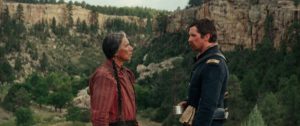HOSTILES is a film that takes itself very seriously. It should. Taking as its themes both human nature’s capacity for violence and its overweening need for mercy, it is not something to be approached lightly, something that director Scott Cooper took to heart in his adaptation of the late Donald E. Stewart’s manuscript.

Wes Studi, Christian Bale
Set in the southwest of 1892, it pits stalwart cavalry officer Capt. Joseph J. Blocker against everything he has done in the military during an unwelcome last assignment before retiring. With his knowledge of language and geography, he is ideally suited for that mission, one that he would almost rather die than accept – safely escorting an old adversary, now dying of cancer, Cheyenne chief, Yellow Hawk (Wes Studi), back to his ancestral lands in Montana to die. The army is not known for dealing kindly with the Native Americans in its conquest of the West, but Yellow Hawk’s plight after seven years in a military prison has caught the attention of the press and made his case a cause célèbre nationally, as Blocker’s commanding officer (Stephen Lang) puts it. With the press paying attention, no less a luminary than the president has ordered the release, and with Blocker’s pension on the line, he reluctantly starts the journey from New Mexico to Montana with a suitably diverse army squad (black corporal Jonathan Majors, waspy West Point lieutenant Jesse Plemons, teenage French immigrant Timothée Chalamet, grizzled veteran sergeant Bill Camp) the old chief, his daughter (Tanaya Beatty), son (Adam Beach), daughter-in-law (Q’orianka Kilcher), and grandson (Xavier Horsechief) through the dangerous territory they must traverse.

Rosamund Pike, Bale
How dangerous is never in question. The film opens with the slaughter of a blissfully homespun family by marauding Cheyennes. Leaving only a traumatized Rosalie Quaid (Rosamund Pike) alive and in the profound state of shock when Blocker and his men come across the burned-out ruins of her life. The gruesomeness of the cold-blooded killing is contrasted by our first shot of Blocker, nonchalantly eating an apple as his men round up a Native American family, the women’s screams so very like Rosalie’s, terrorizing and degrading them as they are herded into the local army fort. Throughout the story, such contrasts will become a recurring motif, as will the trope of characters confronting one another, and themselves, with Socratic dialogues about the actions they have taken in the past as their refuge moral relativity evaporates. None is better than Blocker’s conversation with an old comrade-in-arms (Ben Foster) due to be hanged for a brutal murder. He’s brought up short when his old friend, asked why he committed murder, replies with calm assurance that he’s never killed anyone that didn’t deserve it. That sentence hangs in the air for the rest of the film, as does the question to Blocker about what his life has meant if he’s now protecting the Native American who killed so many of Blocker’s men.
This is a film of passionate performances playing out an allegory that never quite builds the dramatic tension necessary. The scene of Pike tearing at the earth with her bare hands to dig the graves of her husband and three children shows a maenad’s frenzy, and her anguished cries splitting the heavens is a thing of wonder. The naked emotion is almost too much to bear. Bale, too, is a study in pain, though mostly subsumed to duty and the necessity of the moment. Still, the choked voice as he bids farewell, perhaps forever, to a friend, causes the same catch in the viewers throat that Blocker experiences.
HOSTILES is so embroiled in its sophisticated philosophical wrestling that if fails to create a compelling plot. Instead it is a coolly observed pilgrim’s progress on a terrestrial ship of fools encountering stereotypical dangers designed to bring the protagonists together. That Blocker and Yellow Hawk will eventually find common ground is never in doubt. It’s as obvious as the look on Foster’s face when we meet him, a look that says trouble has arrived. Well-intentioned, and framed in exquisite cinematography that is far more lyrical than the storytelling, it is less enjoyable than it is edifying, not unlike a dose of oddly flat seltzer to calm a queasy gut. Yet for all that, it has a final scene of such transcendent poetry, that it almost makes up for whatever else it may lack.
Exceptional acting by all, especially Bale and Studi. One of the best films I’ve seen in 10 years.